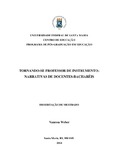| dc.creator | Weber, Vanessa | |
| dc.date.accessioned | 2015-03-11 | |
| dc.date.available | 2015-03-11 | |
| dc.date.issued | 2014-06-10 | |
| dc.identifier.citation | WEBER, Vanessa. BECOMING AN INSTRUMENT TEACHER: BACHELOR-TEACHER S NARRATIVES. 2014. 145 f. Dissertação (Mestrado em Educação) - Universidade Federal de Santa Maria, Santa Maria, 2014. | por |
| dc.identifier.uri | http://repositorio.ufsm.br/handle/1/7147 | |
| dc.description.abstract | This dissertation relates to the Research Field of Education and Arts LP4, at the Education Graduate Department of Universidade Federal de Santa Maria (PPGE/UFSM) and to the study group Education, Action and Research in Music Education (FAPEM). The general objective was to understand the Bachelor in instrument s process of learning to teach musical instruments. In particular, we tried to understand their education process and to investigate the knowledge that these teachers mobilize when teaching their instrument. This research had a qualitative approach and adopted as its methodology the biographic-narrative investigation (BOLÍVAR, DOMINGO, 2006), through which the narratives of three bachelors who teach instruments were produced. By means of textual discursive analysis (MORAES; GALIAZZI, 2013), data analysis categories were created, which were interpreted based on the adopted theoretical framework. In this sense, the production of the text about the learning to teach and about the mobilized knowledge was based on studies by Bolzan (2002), Bolzan and Isaia (2006), Isaia and Bolzan (2009, 2010), Gauthier et al. (2006) e Tardif (2012). While we are aware that the three collaborator s narratives do not represent the totality of the educational path for teaching, we conclude that each bachelor in instrument becomes a teacher-bachelor through the construction and mobilization of knowledge, which are integrated to the being a teacher through education and experience with pedagogical practice. Furthermore, besides the knowledge described by Gauthier et al. (2006) an Tardif (2012), we identified the performance knowledge, which is specific of the instrument teacher. | eng |
| dc.format | application/pdf | por |
| dc.language | por | por |
| dc.publisher | Universidade Federal de Santa Maria | por |
| dc.rights | Acesso Aberto | por |
| dc.subject | Formação de professores de instrumento | por |
| dc.subject | Saberes docentes | por |
| dc.subject | Construção da docência | por |
| dc.subject | Investigação biográfico-narrativa | por |
| dc.subject | Education of instrument teachers | eng |
| dc.subject | Teaching knowledge | eng |
| dc.subject | Construction of teaching | eng |
| dc.subject | Biographical-narrative investigation | eng |
| dc.title | Tornando-se professor de instrumento: narrativas de docentes-bacharéis | por |
| dc.title.alternative | Becoming an instrument teacher: bachelor-teacher s narratives | eng |
| dc.type | Dissertação | por |
| dc.description.resumo | A presente dissertação está vinculada à Linha de Pesquisa Educação e Artes - LP4, do Programa de Pós-Graduação em Educação, da Universidade Federal de Santa Maria (PPGE/UFSM) e ao grupo de estudos Formação, Ação e Pesquisa em Educação Musical (FAPEM). Como objetivo geral, buscou-se compreender o processo de construção da docência de instrumentistas bacharéis que atuam como professores de instrumento. Especificamente, procurou-se compreender seus processos formativos e investigar os saberes que esses professores mobilizam na docência do instrumento. A pesquisa, de cunho qualitativo, adotou como metodologia a investigação biográfico-narrativa (BOLÍVAR, DOMINGO, 2006), por meio da qual foram produzidas as narrativas de três bacharéis formados pela UFSM, professores de instrumento. Por meio da análise textual discursiva (MORAES; GALIAZZI, 2013), foram criadas categorias de análise dos dados das narrativas, os quais foram interpretados com base no referencial teórico adotado. Neste sentido, a escrita sobre a aprendizagem da docência e sobre os saberes mobilizados durante a prática pedagógica teve como base estudos de Gauthier et al. (2006), Tardif (2012), Bolzan (2002), Bolzan e Isaia (2006) e Isaia e Bolzan (2009, 2010). Conscientes de que as narrativas dos três colaboradores não representam a totalidade dos percursos formativos para a docência, concluímos que cada bacharel em instrumento torna-se um docente-bacharel através da construção e da mobilização de saberes, os quais são integrados ao ser professor por meio da formação e da experiência com a prática pedagógica. Além disso, apontamos que além dos saberes descritos por Gauthier et al. (2006) e Tardif (2012), identificamos o saber da performance, específico ao professor de instrumento. | por |
| dc.contributor.advisor1 | Garbosa, Luciane Wilke Freitas | |
| dc.contributor.advisor1Lattes | http://buscatextual.cnpq.br/buscatextual/visualizacv.do?id=K4735904Y6 | por |
| dc.contributor.referee1 | Araújo, Rosane Cardoso de | |
| dc.contributor.referee1Lattes | http://lattes.cnpq.br/6547336486805388 | por |
| dc.contributor.referee2 | Oliveira, Valeska Maria Fortes de | |
| dc.contributor.referee2Lattes | http://buscatextual.cnpq.br/buscatextual/visualizacv.do?id=K4728785U2 | por |
| dc.contributor.referee3 | Bellochio, Cláudia Ribeiro | |
| dc.contributor.referee3Lattes | http://buscatextual.cnpq.br/buscatextual/visualizacv.do?id=K4794804H4 | por |
| dc.creator.Lattes | http://lattes.cnpq.br/6971457102385633 | por |
| dc.publisher.country | BR | por |
| dc.publisher.department | Educação | por |
| dc.publisher.initials | UFSM | por |
| dc.publisher.program | Programa de Pós-Graduação em Educação | por |
| dc.subject.cnpq | CNPQ::CIENCIAS HUMANAS::EDUCACAO | por |


